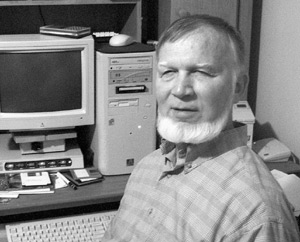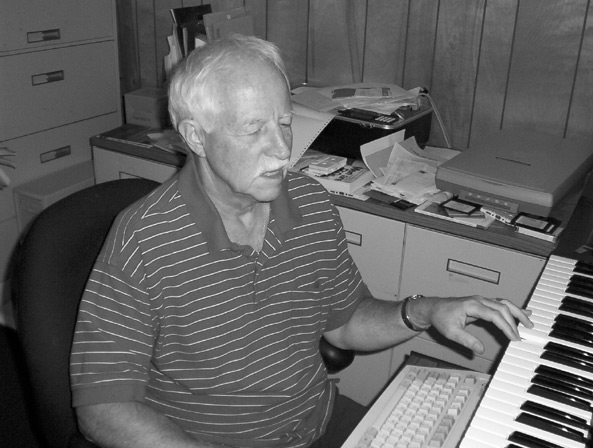Technology has made such a difference in the realm of employment for so many people who are blind or visually impaired that its rewards after work are sometimes forgotten. By "after work," I mean not just the time after you leave the office and catch the bus for home, but the retirement stage that comes with hanging up the work persona altogether.
Retirement is a state of being that many look toward longingly as an open field of time when the pursuit of personal interests promises wild possibilities. For some blind retirees, those possibilities involve technology, as retirement frees them to discover new technological tools and tricks.
Conquering His Own Bias
Bud Keith's memories of early forays into the land of assistive technology are far from idyllic. As a senior equal opportunity specialist in the Office of Civil Rights, U.S. Department of Health and Human Services, Washington, DC, he was involved in enforcing civil rights laws in defense of people with disabilities and senior citizens and in dealing with some sex and racial discrimination cases. His tools for years were a Perkins brailler, an audiotape recorder, a slate and stylus, and an electric typewriter, and they seemed adequate. But one day, he recalled, "Somebody came and said they were going to give me a computer and train me. I resisted. I was happy doing what I was doing." By the time the training was completed, however, his resistance was replaced by enthusiasm for his newfound productivity. That first computer, an Osborn CP/m-based system with a speech program called Avos and an Echo speech synthesizer, would, of course, eventually be replaced by newer technologies.
"What really switched me on," Bud said, "was the word processing. I've always been a writer. My work required a lot of writing, and when I was able to read my own work and save it and didn't have to be so anxious about typing perfectly, so much opened up. My writing improved and, for the first time since I'd been blind, I could retrieve information faster than my sighted peers."
Caption: Bud Keith became an Internet expert only after he retired.
When Bud was diagnosed with advanced prostate cancer at age 56, he concluded that the retirement he had always dreamed about should be taken early. That decision was made in 1996, and because of what he calls a combination of luck and attitude, the likelihood of "something else killing me before the cancer does" constantly increases. In his seven years of retirement, he has used technology in myriad ways to increase his enjoyment of everything from fine dining to points of interest in several foreign countries and has honed his skills for the benefit of many volunteer commitments as well. His first extensive use of technology after his retirement was research on the World Wide Web to learn more about his own illness. Doctors are frequently too busy to keep up with all the latest treatments, in Bud's view, and he could be proactive in his own recovery by gathering information. "Web surfing is one of the most wonderful things about technology for blind people," Bud commented. "On the Web, I learned about my disease, became a knowledgeable patient, and thus became the manager of my own health care."
In addition to his research on cancer, Bud's growing Internet expertise quickly fed other passions. As the primary cook for his wife and himself, he searches the Internet for interesting recipes. An avid traveler, he has read extensively about such destinations as Turkey, New Zealand, Australia, Bermuda, Ecuador, Mexico, Panama, France, Belgium, Norway, England, and Italy. Because of his extensive reading, Bud is often much more familiar with points of interest and general information about the country than are his traveling companions and is able to increase everyone's enjoyment of the trip. "I was a voracious reader when I could see," Bud said, "and was always frustrated as hell in bookstores. Now, with the World Wide Web, I can go there, like walking into a library, and say 'What shelf am I going to look at today?'"
Bud has also mastered building and maintaining databases and volunteers to maintain a 1,000-record database of fellow Peace Corps alumni who, like him, once volunteered in Panama. With a Talking Checkbook program, he has handled the fiduciary responsibilities for his local chapter of the American Council of the Blind and his local Ski for Light group. The man who once resisted using a computer that was placed on his desk at work now embraces the use of technology every day in his retirement.
The Law of Increasing Returns
Chris Bell was only 49 when he retired from a fast-paced career as an attorney specializing in disability and employment law. His impressive career path moved him from high school history teacher to civil rights lawyer to stockbroker and back to lawyer again, and every one of his professional endeavors required the handling of large amounts of printed materials. In 1992, after a five-year stint as an attorney with the Equal Employment Opportunity Commission, Chris joined Jackson Lewis, a private law practice specializing in labor and employment, also in Washington, DC. Chris brought his expertise in disability law to the firm, but this time to the employer's side. During that time, his eyesight, which had been 20/50 in one eye and zero in the other since age 18, began to deteriorate.
Caption: Chris Bell has increased his proficiency with assistive technology since retiring.
Although his vision was limited, Chris said, he had been able, up to that point, to read with a magnifying glass or closed-circuit television (CCTV) and was able to travel safely and independently with a white cane. In 1997, he moved his family to Minneapolis, opening a new office for Jackson Lewis there and hiring a half dozen other lawyers who reported to him. "I was traveling up to 50,000 miles a year in those days," Chris recalled, "and giving 30 to 35 speeches around the country. As my vision deteriorated, travel became more of a problem." A series of mishaps and injuries made him realize that he needed to improve his mobility skills and to slow the pace.
Meanwhile, the pace of his workload was increasing, in step with the rest of the country, and Chris became more proficient with scanners and e-mail. Those tools certainly helped him, along with a screen reader and optical character recognition program. Shifting from assistive technology for people who are visually impaired (magnifying glasses and a CCTV) to products used by people who are blind (JAWS for Windows and a Kurzweil 1000 reading machine) boosted his productivity, but, in his view, it wasn't enough. "As a blind person," Chris said, "I could do the same work, but I could never do it as rapidly as my sighted peers. It wasn't a sprint; it was a marathon. I was living a fiction that I could do everything exactly as efficiently as I had before, and it was killing me." Now two years after retirement, Chris finds that both his interest and proficiency in assistive technology have increased. Today, when he is not working with his personal trainer or taking walks with his new dog guide, he is spending at least a couple of hours each day expanding his horizons with technology.
"I read the Wall Street Journal and the New York Times every day online," Chris said, and he does extensive reading on a variety of other subjects researched on the Internet. His old stockbroker mindset is still very much alive, too, so that he now uses JAWS for Windows and Internet Explorer to track and scrutinize investments. His speed and comfort level with the Kurzweil 1000 and screen reading software have grown to such an extent that, as he put it, "I've actually given some thought to doing some part-time work for the law office I got started in 1997."
Composing Himself
When Harvey Miller retired in 1999 after a long and successful career as a college teacher of music, he knew that he would continue his various musical pursuits, but he did not know what an important role his life as a composer would take because of technology. A gifted vocalist, conductor, pianist, and composer, Harvey has many outlets, in retirement, for his musical talent. He sings in his church and in various other environments. In short, he quipped, "When I'm asked, I sing!"
From playing the piano in a trio to conducting an adult chorus performing the Messiah, Harvey's life is filled with music. In addition to singing, piano performance, and conducting, composing music has long been an integral part of his life. Composition has traditionally been a labor-intensive pursuit for any blind musician. For Harvey, being fluent in braille music notation has always been a valuable asset, but it has not sped up the process of moving new music from his imagination to a printed score.
Caption: Harvey Miller composes at the computer.
Initially, he sits at the piano with his Perkins brailler, working out a phrase, and then writes it down. "It's cumbersome," he explained, "because you can't cross out and change things. I use a lot of "for" signs [the full cell, dots 1-2-3-4-5-6, also used to cross out errors], but it can be confusing, too, since that symbol translates in music as an f-sharp." Citing as example an orchestral piece for chorus that he completed two years ago, he related the process from conception to hard copy. After composing all the parts and writing them out in braille music notation on the Perkins brailler, he then dictated each part to a sighted reader of music, who copied them on music paper. Next, Harvey took the print dictation of his composition to another musician, who played the parts back to him, so he could confirm that what he had written had remained intact through dictation. Finally, after corrections were made, a sighted person produced all the parts in printed music form.
Thanks to technology, that tedious process has been dramatically altered. Today, Harvey, like many blind musicians, composes music at his computer, typing on a standard QWERTY keyboard, changing and editing with the ease that many computer users are familiar with in the realm of word processing. Braille and print copies can then be generated by the computer as well. Sibelius Speaking, a version of Sibelius that has been adapted to work with JAWS screen-reading software, makes it possible for Harvey to move his ideas from the initial notation to professionally printed sheet music.
"When I first saw Sibelius demonstrated last summer," he said simply, "I cried." Today, he still marvels that he is finally able to complete a composition entirely without sighted assistance. At least half his time is now spent composing, and the other half is spent performing. Most recently, he was commissioned to write a piece for two harpsichords and one French horn. Since he plays the harpsichord and his daughter plays the French horn, he is equally enthusiastic about performing the piece when it is completed.
Relishing the Results
Many of us have lamented that because there is work to be done, we do not have the freedom to explore and expand horizons with the power of the assistive technology that is available to us. Perhaps retirement, as illustrated by the experience of these three men, can be viewed as an opportunity to develop these skills and relish the results.


